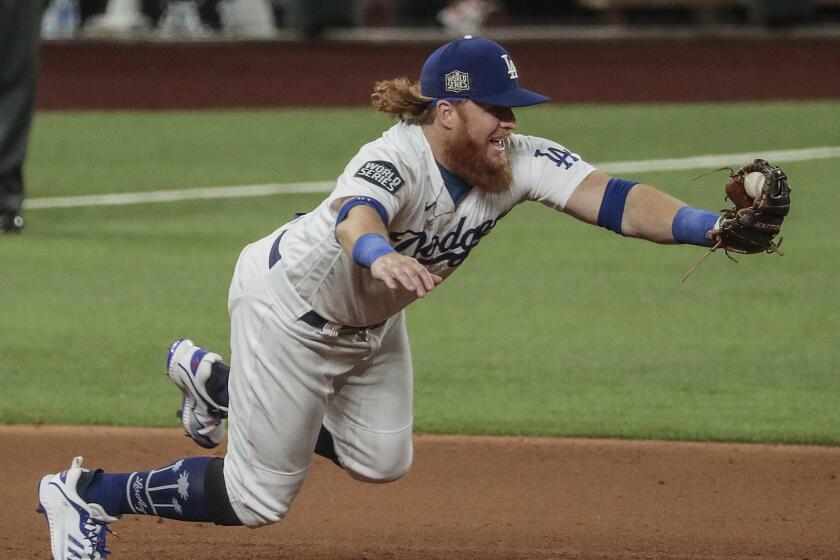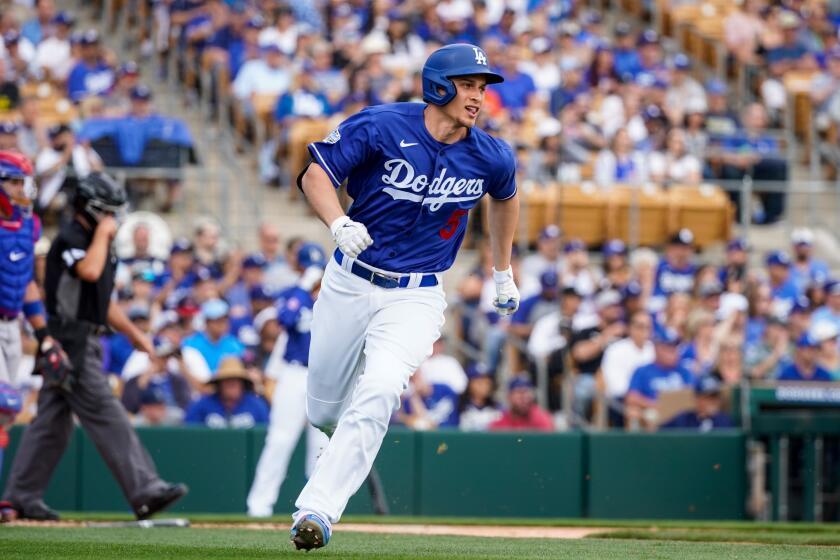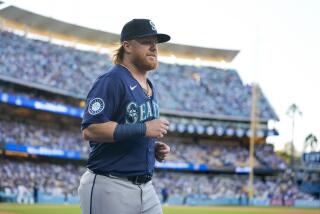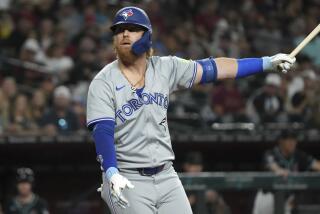Dodgers and Justin Turner agree on two-year, $34-million deal after long standoff
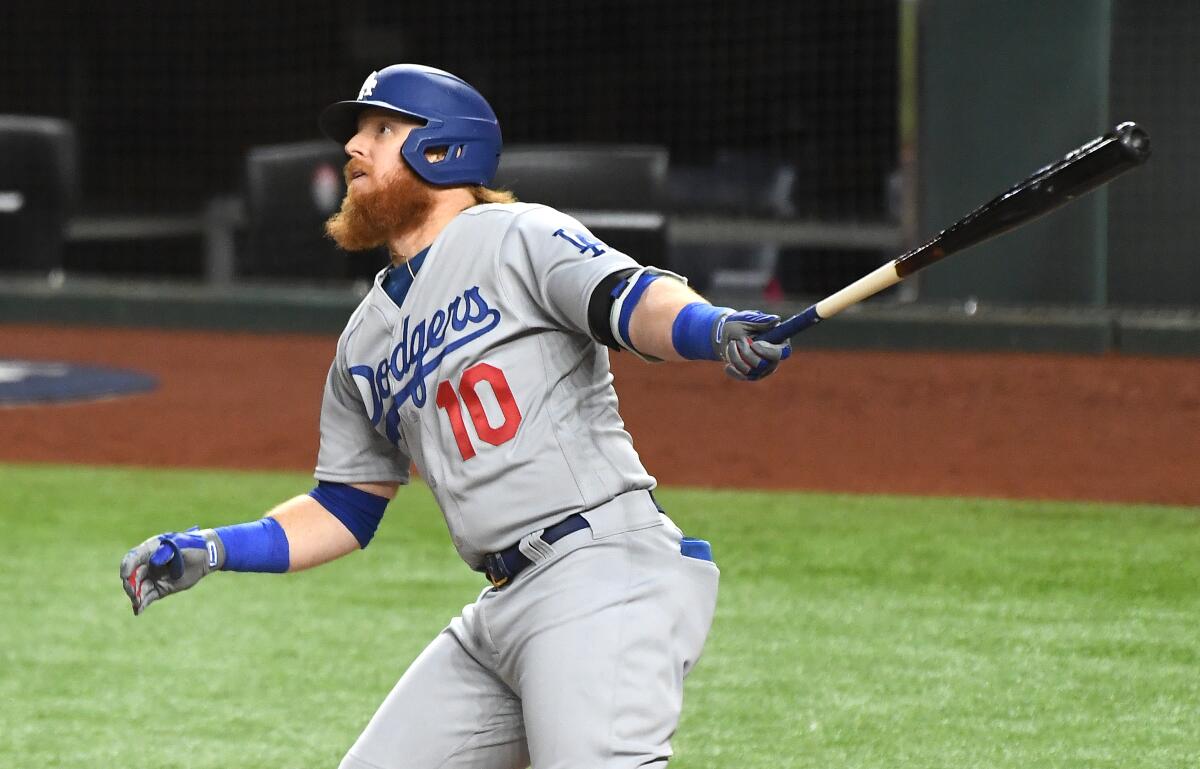
- Share via
It took nearly the entire offseason, longer than anyone could’ve expected, but the Dodgers and Justin Turner agreed on a two-year contract Saturday to keep the third baseman in Los Angeles four days before pitchers and catchers report for spring training Wednesday.
The deal is worth $34 million guaranteed, including an $8-million signing bonus, with a $14-million club option for a third year, according to people with knowledge of the situation. Escalators based on where Turner finishes in the MVP voting could raise the total value to $52 million over three seasons.
The contract is pending a physical and the Dodgers making a move to create a spot on the 40-man roster.
Turner’s addition, two days after Trevor Bauer’s $40 million was officially added to the 2021 ledger, balloons the Dodgers’ projected competitive balance tax payroll to $254.7 million, according to Cot’s Baseball Contracts, by far the biggest in the majors. The Boston Red Sox are second at $204 million.
By surpassing the $250-million mark, the Dodgers are in position to pay the stiffest CBT penalties: a 42.5% tax rate on all overages along with having their first pick in the upcoming draft drop 10 spots. The club, however, could shed payroll to avoid the harshest taxes.
Turner’s pact concludes a 3½-month standoff between the two sides. The 36-year-old Turner reached free agency seeking a contract of three or four years. The Dodgers committed to a two-year offer and didn’t budge as Turner tested the market for suitors. The Dodgers eventually won out.
Turner’s return ensures his final act as a Dodger won’t be igniting a controversy the night the Dodgers won the World Series when he was informed during Game 6 of the World Series that he had tested positive for COVID-19 but went on the field during the postgame celebration anyway.
It would’ve been a strange ending to a memorable Dodgers career. The Lakewood native vaulted from released reserve to one of the elite hitters in the majors in his first seven years with the club. He became a fan favorite for his production, clutch October performances and distinct red look. He evolved into a clubhouse and community leader. He is beloved in Southern California.
But injuries hampered Turner in recent seasons. His mobility diminished. He isn’t the same defender anymore. The Dodgers, as a result, didn’t want to commit to more than two years. Turner attracted consideration from other clubs. The Atlanta Braves, Milwaukee Brewers, Toronto Blue Jays and New York Mets, at one point or another, had interest in signing him.
The Dodgers are keeping hometown hero Justin Turner for at least two more seasons, and the deal made too much sense for both sides to not happen.
Ultimately, he took the Dodgers’ offer. He’ll return to a lineup he helped propel to the franchise’s first championship in 32 years last season.
Turner arrived in Los Angeles in 2014 as an afterthought. He debuted in the majors in 2009 at age 24. He wasn’t a full-time big leaguer for another two years. He was never an everyday player in his three full seasons with the Mets before the club non-tendered him in December 2013. He was projected to make less than $1 million the next season through arbitration. The Mets decided he wasn’t worth it.
Teams weren’t clamoring for Turner that winter. He went months without a deal until Tim Wallach, then the Dodgers’ bench coach, saw Turner at a Cal State Fullerton alumni game. The two spoke. Turner soon signed a minor league contract with an invitation to spring training, fulfilling a childhood dream.
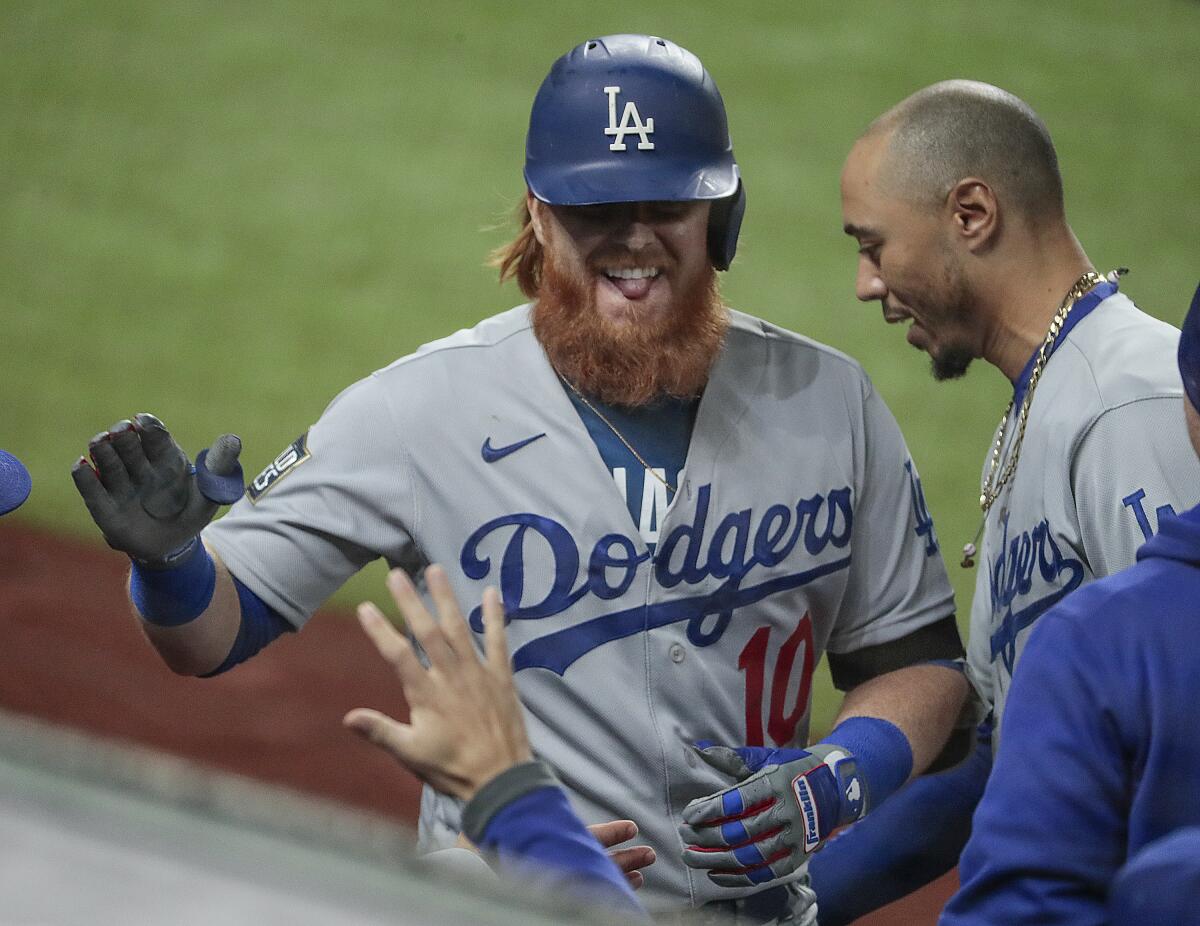
Turner competed for a spot on the major league roster that spring and claimed one, but as a bench player.
He earned playing time in 2014 around the infield with a breakout season, batting .340 with an .897 on-base-plus-slugging percentage in 322 plate appearances. The surge was fueled by a swing change he initiated in his final year with the Mets. He was the Dodgers’ everyday third baseman by the middle of the 2015 season and didn’t relinquish the job.
He finished ninth in the National League MVP voting in 2016. That winter, the Dodgers gave him a four-year, $64-million contract. In 2017, he made his only All-Star team, finished eighth in the MVP voting, and became a postseason hero the next year when he belted a walk-off home run in Game 2 of the National League Championship Series against the Chicago Cubs.
The homer came on the 29th anniversary of Kirk Gibson’s walk-off home run in Game 1 of the 1988 World Series. Turner, a nearly 4-year-old budding Dodgers fan, watched it at his grandmother’s house.
Turner remained a consistent performer even as nagging injuries mounted and his mobility diminished over the remainder of his four-year contract. He has batted .302 with an .886 OPS and 139 OPS+ during the regular season in seven years with the Dodgers. The production was nearly identical in the club’s seven postseason trips: a .295 batting average and .899 OPS in 72 games.
The Dodgers announced that 2,400 people will be allowed to attend each spring training game at Camelback Ranch this year amid the COVID-19 pandemic.
A hamstring strain hampered Turner in 2020. He landed on the injured list for nearly a month. He was limited to 42 of the Dodgers’ 60 regular-season games. He never looked quite right but started all 18 postseason games, accumulating three home runs and six doubles in 78 plate appearances.
He didn’t, however, finish the Dodgers’ World Series run on the field. He was quarantined in the team’s clubhouse at the end of Game 6 of the World Series at Globe Life Field after he was informed during the seventh inning that he had tested positive for the coronavirus. He was removed from the game before the eighth inning.
Moments after the Dodgers secured the championship, word surfaced of Turner’s positive test. Confusion ensued minutes later when he appeared on the field wearing a mask during the team’s celebration for photos before removing the mask for the team photo. His decision ignited an uproar and became a national story. The next morning, Major League Baseball announced it was investigating the situation in a stern press release blaming Turner for the episode.
“Turner was placed into isolation for the safety of those around him,” MLB said in the statement. “However, following the Dodgers’ victory, it is clear that Turner chose to disregard the agreed-upon joint protocols and the instructions he was given regarding the safety and protection of others.
Trevor Bauer’s social media behavior has come under renewed scrutiny for incidents where he was accused of harassing women and spreading conspiracy theories.
“While a desire to celebrate is understandable, Turner’s decision to leave isolation and enter the field was wrong and put everyone he came in contact with at risk. When MLB security raised the matter of being on the field with Turner, he emphatically refused to comply.”
Turner didn’t comment publicly for another nine days when he, MLB and the Dodgers issued separate statements to bury the matter. Turner apologized. MLB assumed some blame and said he wouldn’t be disciplined. The Dodgers described the sequence as “ultimately regrettable.”
For months, there was a chance Turner would never play for the Dodgers again. It took longer than expected, but he’s a Dodger again, maybe for the rest of his career.
More to Read
Are you a true-blue fan?
Get our Dodgers Dugout newsletter for insights, news and much more.
You may occasionally receive promotional content from the Los Angeles Times.

